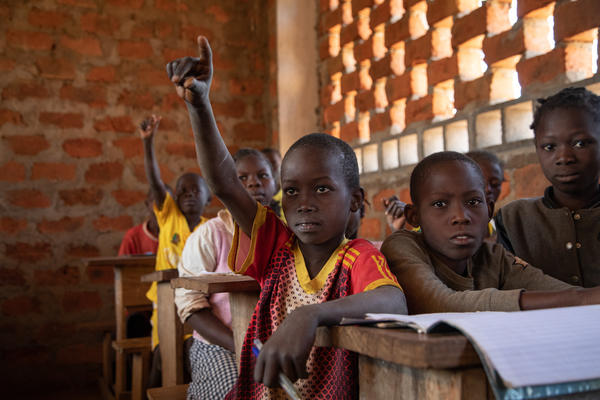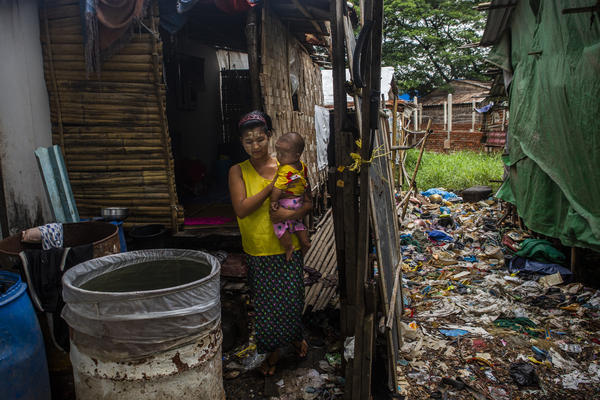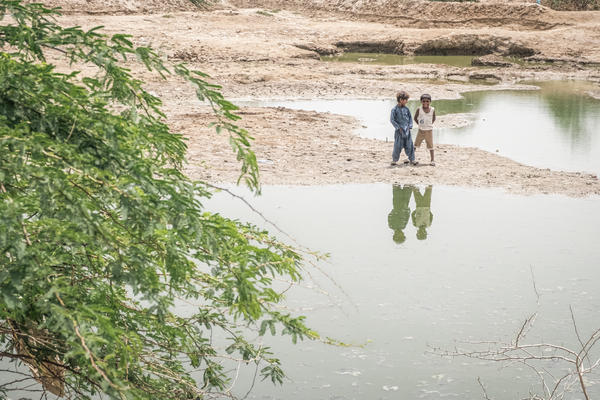Request support on coordination, information management, capacity development or other education in emergencies areas.
Demande de soutien en coordination, gestion de l’information, développement des capacités et autres domaines de l'éducation en situation d'urgence.
لطلب الدعم في مجال التنسيق ، إدارة المعلومات ، تنمية القدرات أو في اي مجال من مجالات التعليم في مناطق الطوارئ
Solicitar apoyo en coordinación, gestión de la información, desarrollo de capacidades u otra áreas en educación en emergencias.
Children living in emergencies around the world still face enormous barriers to access education. Conflict, COVID-19, economic shocks, and climate-related disasters have rolled back global gains in recent years, introducing new obstacles and compounding existing challenges.
The GEC has been working to enhance education in emergencies responses and preparedness by improving the availability of data and evidence that speaks to the needs of crisis-affected children, supporting Joint Needs Assessments and Education Cluster strategy development processes in-county.
As part of this work, Education Cluster partners conducted child-friendly focus groups with children and adolescents in their respective countries of operation. The consultations with children aimed to better understand girls’ and boys’ needs and priorities, and elevate their voices when designing interventions and recommendations. Children participating in focus groups expressed the difficulties they face in their daily lives when trying to go to school, and how receiving an education could benefit their livelihoods and futures.
Here is how they describe their concerns and hopes, in their own words:
"Children are under a lot of pressure from adults to get married [...]" – 13-15 year old girl, Central African Republic

Child marriage is the primary reason cited for dropping out of school in the Central African Republic, notably for girls aged 13-15, according to a 2023 assessment. Young girls explain that parents initiate their exit from school due to imminent forced marriage, sometimes even refusing to pay their school fees.
Poverty was cited as the next most prominent reason why children leave school: “We are sometimes expelled for non-payment of school fees, including the parents' monthly master fees. As a result, we don't feel equal to the other pupils and we feel it's better to give up. Our parents don't pay us for certain exams, and we end up repeating the same classes because of this,” explained one female student aged 10-12 from the town of Bossangoa. A male student of the same age stated: “You can't go to school empty-handed and always poorly dressed.”
Students also expressed how they are negatively affected by the armed conflict experience in the country – at times right on their doorstep. “I’m afraid when I hear gunshots right next to school,” said one boy age 10-12 from the town of Kaga-Bandoro. Students are often haunted by memories of violent conflict, causing psychological distress. “We fear the events experienced in the past, and we think that it can happen again while we’re at school,” said a female student aged 13-15 from Kaga-Bandoro. Another girl of the same age explained: “I am afraid of the ghosts of people killed by armed men in the school compound.”
Another area emerging in focus groups is that parents sometimes prefer to send their children to work in the fields, take care of their siblings or engage in domestic work rather than attend school. While some children understand these needs, one boy aged 10-12 from the town of Alindao stated: “A child’s place is at school, not in the field and even less at home [doing domestic work].”
“Sometimes I feel like quitting school because my parents don’t have the means.” – 13-15 year old boy, Burkina Faso
Children in Burkina Faso cited the need for paid work as the primary reason for dropping out of school, reflected in 49% of the focus groups with children conducted in 2022. This is particularly the case for older children, aged 13-15 and boys. As conditions in the country deteriorate from the complex security and political crises, families are working with dwindling resources and often rely on older children to help provide for the household.
A girl age 13-15 years said, “Parents don’t even have food anymore, let’s not talk about enrolling their children in school.” Another female student age 9-12 stated: “Many children abruptly abandon their studies because the parents can’t pay the school fees.”
Security was reported as the second highest concern by children participating in focus groups in Burkina Faso. The presence of unidentified armed groups dissuades both children and their parents from sending them to school, and the threats cause severe psychosocial damage.
“Our parents tell us to leave school so that the unidentified armed groups don’t come to our village,” stated one boy aged 9-12 years. “The unidentified armed groups don’t want school so they can come chase us or kill us.”
Despite these immense challenges, children also emphasized the “joy of meeting friends again” and “succeeding in the primary school certificate exam” as benefits to continuing education.
"Children are scared, mentally hurt, and unhappy" – caregiver, Myanmar

Caregivers in Myanmar reported that the political situation has adversely affected children’s learning in several ways. Most cited safety concerns in a 2022 assessment as the primary reason, with many schools intermittently closed due to conflict. Others stated that they chose not to send their children to school for fear of their safety – a sentiment echoed by children themselves. Children often have to walk long distances to reach schools in other villages and security concerns are particularly acute for female students.
Both caregivers and children who took part in consultations also noted that school closures impacted children’s learning. Previous levels of knowledge decline when children are out of school, which leads to a loss of motivation and difficulty catching up when learning resumes. One caregiver reported, for instance, that "teachers who are currently working just have a high school degree, so compared to the teachers before the coup d’état, their teaching quality is lower."
COVID-19 has had a harmful effect, either directly or indirectly, on children’s wellbeing and education. Children indicated having suffered school closures which resulted in increased drop-out for several reasons, and they continue to fear that schools may close again.
According to consultations with children aged 14-17, raising awareness about the value of education amongst children and parents emerged as a priority issue, and devaluing the importance of education was cited as the primary reason why adolescent boys and girls drop out of school. Other top reasons mentioned by children include financial constraints, the political situation, distance from school, and students being below grade level.
“I can’t put on my school uniform. I am afraid because I can be beaten and kidnapped.” – student, Cameroon
Security is one of the primary challenges identified by children in Cameroon. Children reported in an assessment done in 2021 hearing gunfire and experiencing a general sense of insecurity either in school or on the way.
"I don't feel safe because there is no fence. Each time there is a shooting, we hear the gunshots,” said one student. “It is sometimes difficult walking alone to school; you never know what will happen. Our schools should provide school buses to make it safe,” stated another.
In 73% of focus group discussions, it was revealed that children knew of other students traveling elsewhere to get an education due to safety concerns. One student said: "Most of my friends left for different towns because their parents never wanted this crisis to interrupt their studies.”
Another issue emerging in focus groups was the need to address financial barriers preventing children’s access to education. "School should pay fees for children: this will help vulnerable children like us to access education," said one child aged 9-12. "If my parents cannot send me to school because there is no money, I'll look for work to do, so that I can go to school.”
"The road to school was all muddy and flooded; it was impossible to walk through." – 11-14 year old male student, Pakistan

Pakistan had the second highest number of out-of-school children globally, even prior to the devastating floods in 2022. The floods further disrupted education systems, displaced populations, and the damaged roads and infrastructure made it impossible for children to travel to or attend school safely.
“We were moved to a relief camp, but it was far from school, and transportation was nearly impossible,” said one student, aged 11-14 from Jamshoro district, recorded in a 2023 assessment.
Poverty has increased since the flooding, and financial constraints emerged as the most significant barrier to education according to children across various regions in Pakistan. Families, many of whom lost crops and livestock in the floods, often struggle to meet basic needs and find it challenging to allocate resources for educational expenses such as books and uniforms. Many children, both girls and boys, are compelled to engage in labor to contribute to family income, further hindering their access to education.
“I collect trash to sell; going to school is a luxury I can't even think about," said one boy not attending school, aged 11-14, in Jamshoro.
For girls, child marriage surfaced as a key barrier to education. In the focus groups, girls explained the cultural and economic reasons driving early marriage, and the difficulty in continuing education after getting married, while also speaking of progress: “We girls don’t want to get married this young, but they ask us to. After the child protection program, it’s changing. They just get us engaged but don’t get us married,” said one girl, aged 11-14, who was not attending school.
Another 11-14 boy not attending school stated: "I've seen girls achieving amazing things when they're educated; I want that for all my friends."
Quotes have been translated into English.
Photo credits in order of appearance: UNICEF/UNI451580/LeMoyne (banner); © UNICEF/UNI451785/LeMoyne; © UNICEF/UNI486302/Dejongh; © UNICEF/UN0645247/Htet; © UNICEF/UN0704358/Beguel; © UNICEF/UNI431608/Sokhin
Associated links
- Consult the Joint Needs Assessments supported by GEC here.
- Learn how to consult children in Education in Emergencies Needs Assessments with the Quick Guide and Supplementary Guide, and other easy-to-use tools available here.
